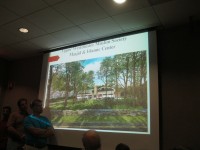Mosque Proposal Sparks Heated Debate in New Castle

The Upper Westchester Muslim Society was back before the New Castle Zoning Board of Appeals July 30, a little more than one year after its application for a special permit for a proposed mosque on Pines Bridge Road passed through the Draft Environmental Impact Statement process.
Wednesday’s meeting was a combined public hearing on the Final Environmental Impact Statement and the special permit.
Again, the project attracted an overflow crowd at town hall and the heated discussion lasted about three hours.
Michael Zarin, an attorney representing the Upper Westchester Muslim Society, noted that his client first proposed the mosque in 2006. Zarin’s law firm is also representing an institutional land owner in White Plains where a similar controversy between an institution and the residential neighborhood in which it resides has caused a special permit to take years in the review process with many changes made to the applicant’s plan along the way.
Zarin said his client has been receptive to comments from town residents and the ZBA. For example, the revised proposal reduced the number of parking spaces originally sought by 45 percent, and UWMS has met with owners of adjoining properties to receive permission to use their lands for overflow parking during the high holy day services that take place on two days each year.
Diego Villarerle, a consultant employed by the applicant, said the 25,000 square foot building would be located on an 8.3-acre parcel located at 130 Pines Bridge Rd. The maximum number of persons allowed in the building would be 650, he said. The revised number of parking spaces sought for the parcel has been reduced from the originally proposed 217 spaces to 120. If the project was approved the UWMS would be required to contact the town at least 45 days before a high holy day to explain where the overflow parking would be placed, he said.
Villarerle said the project also proposes to widen Hoag Cross Road by eight feet to a new width of 26 feet, which would allow emergency vehicle access to the street.
Several residents said the mosque was not a good fit with the neighborhood and the project should be rejected by the ZBA.
Resident Susan West noted that some supporters of the proposed mosque have said that under federal law they have a right to construct a religious institution, but that applies to commercial, not residential areas, she said. If the structure was constructed there, Stillwater Lake would be threatened by pollution, she added.
Resident Ronald Steinwurzl said the mosque would be disruptive to the neighborhood. The Muslim Society has the right to seek to construct a house of worship, but, he added, “don’t build it on this site.”
Steinwurzl said the proposal does not meet several town codes, including the town’s master plan, which is in the process of being revised. The FEIS does not take into account new water quality regulations from the state Department of Environmental
Conservation, which were enacted in March, he said.
If the town approves the project Steinwurzl said an Article 78 lawsuit from residents would be filed against the town to stop it.
Resident Eric Goldberg said a 25,000 square foot building was not in keeping with the rural character of the neighborhood. Resident Robert Buzak said the mosque would generate additional traffic to the area, which already has too much.
Resident Joseph Field also said a mosque was not appropriate for the neighborhood. Constructing a mosque would be like having “a round peg trying to fit into a square hole,” he said.
A supporter of the project, resident Elinor Griffith, said she has known members of the UWMS for years and their presence would be positive for the town. The Muslim Society “has been a good neighbor for many years,” she said.
The ZBA voted 4-4-1 to keep the combined public hearing on the FEIS and the special permit application open for the board’s next meeting on Sept. 22.

